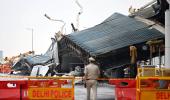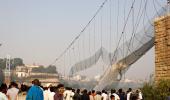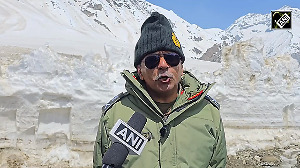Government officials believe that central bridge projects perform better than state projects due to stricter checks and balances.

The main reasons for bridges, airports, tunnels, and irrigation barges collapsing or showing signs of distress in the past year are design flaws, poor tendering prioritising the lowest bidder, and a shortage of skilled engineers.
This conclusion comes from ministry officials, industry executives, and infrastructure consultants.
Delhi airport's Terminal 1 saw its canopy collapse on June 28, followed by a similar incident at Rajkot airport in Gujarat a day later.
At least six other cases of flooding or ceiling/canopy collapse have been reported at different airports over the past year.
In Bihar alone, over a dozen bridges have buckled like ninepins in a fortnight.
According to the highway minister's reply to MPs last July, 21 bridges had been damaged over the past five years.
Some government officials believe that central bridge projects perform better than state projects due to stricter checks and balances.
They advocate for upgrading tendering and bid awarding processes in several states to prevent such issues.
Shivdutt Das, executive director of the Vishwa Samudra Group, underscores the need to prioritise expertise over the lowest bidder in project awards.
"Being price competitive or the lowest bidder should not overshadow considerations of design and execution pedigree," Das says.
Praveen Sethia, founder of Infra Advisors, criticises aggressive bidding practices that often lead to using sub-standard materials due to bids being as low as 30 to 40 per cent lower than government estimates.
Highway Minister Nitin Gadkari has been a fierce critic of the way consultants prepare detailed project reports, once quipping that these professionals use the Internet to make critical project plans.
A former National Highways Authority of India official points out another core issue: The quality and availability of civil engineers.
"Civil engineering is neither a preferred course nor do most civil engineering graduates from top national institutes opt for on-field jobs after graduation," he says.

Extreme weather events are increasingly implicated in infrastructure durability issues.
A heavy rainfall event in Delhi, the highest in 85 years for June, is cited as a primary cause for the Terminal 1 canopy collapse by a spokesperson for Delhi airport.
Experts believe that, given that climate change is here to stay, "climate intensities" need to be factored in.
"A possible learning is that climate-resilient infrastructure will need to be designed for more extreme conditions," says Manish Agarwal, co-founder, AskHow.
At the recent Larsen & Toubro annual general meeting, shareholders took note of the rise in incidents such as leaks and flooding in projects like the Pragati Maidan tunnel and Ram Mandir construction where L&T was the contractor.
In his response to shareholders, S N Subrahmanyan, chairman and managing director, said there were no project-related leakages on either side and blamed the flooding on the adjacent housing colonies and government offices.
He added that the drainage work at the Ram Mandir had not even been completed.
L&T declined to comment on an e-mail query asking about the Pragati Maidan project and the Medigadda irrigation project in Hyderabad.
Last October, the piers of the Medigadda barrage, part of the Kaleshwaram Lift Irrigation Project, looked as though they were sinking.
The increasing incidents around infrastructure projects may also have a bearing on the creditworthiness of the smaller entities.
Sudhir Kumar, founder of Leapfrog Advisory Solutions, said that if the impact is immediate, then a credit rating call is taken right away.
"If the impact is such that we are not able to ascertain the extent, then we will put the ratings under a credit watch and wait to see the impact and then take a call accordingly," said Kumar.

In February, CRISIL removed SP Singla Constructions from its credit watch because a lender's independent engineer report said the bridge it was building at Bhagalpur in Bihar had collapsed last year 'due to some unknown scientific phenomenon' and insisted that SP Singla Constructions had carried out all due diligence.
CareEdge in April said it had noted the collapse of a section of the under-construction Silkyara Bend-Barkot Tunnel for which Navayuga Engineering Company was the contractor.
CareEdge added that, according to Navayuga's understanding, the company does not expect any liability assigned to the company towards the incident.
Officials say:
- States need to upgrade the tendering and awarding process
- There is a lack of skilled engineering labour
Industry executives say:
- The lowest bidder should not be the deciding factor
- Challenges are inevitable in large-scale projects and need to be addressed at the design stage
Infrastructure consultants say:
- Climate-resilient infrastructure will need to be designed for more extreme conditions
Feature Presentation: Aslam Hunani/Rediff.com













 © 2025
© 2025